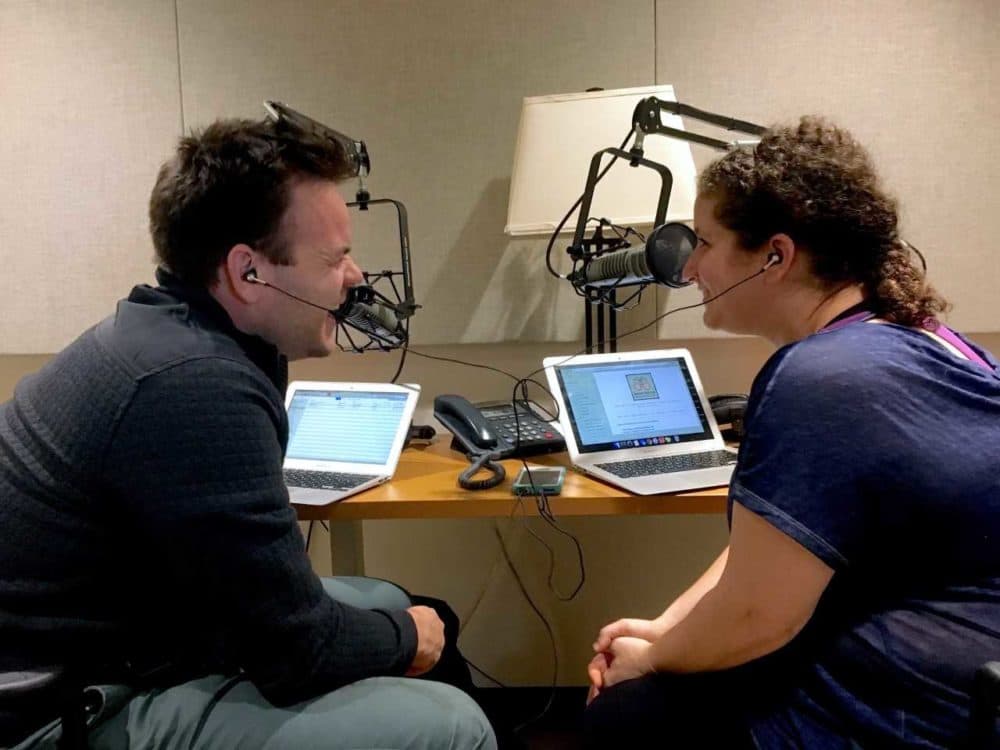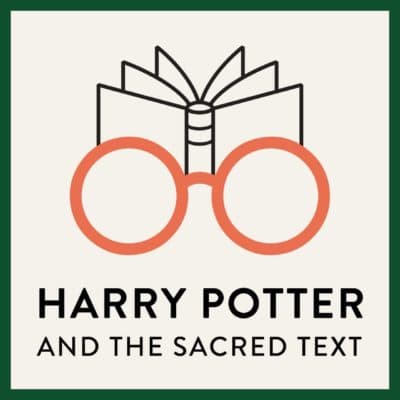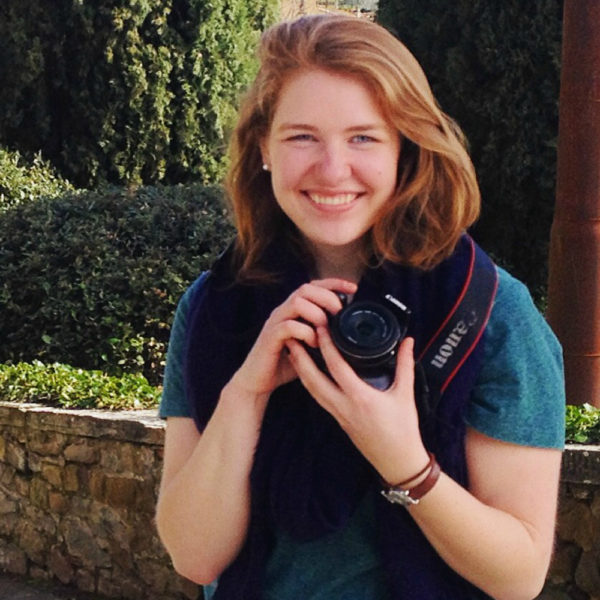Advertisement
In A Harry Potter Podcast, A Search For Meaning In The Secular Through The Sacred

The team behind the popular podcast "Harry Potter and the Sacred Text" wants to be very clear: They are not starting a Harry Potter religion.
In fact, the idea of a higher power has nothing to do with the weekly show.
Instead, co-hosts Vanessa Zoltan and Casper ter Kuile — both chaplains who were trained at the Harvard Divinity School — and the show's producer Ariana Nedelman seek to use religious reading practices to address what they see as a hole left by institutional religion.
"I think institutionalized religion is really bad at being welcoming," said Zoltan. "I think people are lonely. I think people are desperate for community."
"It's not a bad thing, not to have a church, but we need a space," said Nedelman
Their goal with the podcast is to pursue that space. By treating the "Harry Potter" books with the deep attention traditionally reserved for texts religion has deemed sacred, the team aims to help listeners carve out community and connection to what they love in their own lives.
"[It's] the idea that if you love what you love with rigor, deep in it, spending that time will not just give you comfort, but help you think about your life better," said Nedelman.

The podcast grew out of Vanessa Zoltan's own struggles with religion. An atheist with grandparents who survived the Holocaust, she struggled with systems of prayer to a benevolent God that in her words, was really bad at addressing suffering in the world. But she loved the reverence of religion, and meaning the words of the Torah held for the Jewish faith.
"I don't think I need God to have a spiritual practice," Zoltan said. "I'm an atheist who really loved God language, and loves religion done well, but hates religion done poorly."
While at the Harvard Divinity School, Zoltan began exploring applying that reverence to secular texts instead. She determined that to do so, the practice required three things: faith, rigor and community.
"A text is sacred because a community says it is," she said. "It's really in the eye of the beholder, and the practitioner."
That study of the secular as sacred led to a book club, first reading "Jane Eyre" and then joining with ter Kuile to read "Harry Potter." The weekly meeting exploded in popularity, and in 2016 transitioned into the podcast in order to reach more people. According to the producer, it reaches about 1 million listeners monthly.
"There's something really unique about 'Harry Potter' and its ripeness for this," said Zoltan.
The podcast works chronologically through the books, with each episode corresponding with a chapter. The hosts — after a 30 second recap of what happened in the chapter — open a conversation about the text through a particular theme. At a recent live event at the Oberon in Cambridge, they read "Harry Potter and the Order of the Phoenix" through a lens of failure, examining Hermione Granger's failed attempt to liberate the Hogwarts house elves by leaving clothing throughout Gryffindor Tower.
Zoltan and ter Kuile then home into a small part of the text, usually a sentence or phrase, and apply a traditional reading practice to tease out a deeper meaning.
"We are reading looking for meaning, and looking for life lessons to glean, and we are looking for it to be instructive in our lives," said Zoltan. "We want it to answer questions in our own lives, and we bring those questions intentionally to the text. It's a very earnest action."
Each episode then ends with a blessing for one of the characters.
The podcast team sees the deep traditional reading practices as tools they hope listeners will internalize, and use to form community and connection not only with the "Harry Potter" text, but with whatever they deem as sacred in their lives.
One of those practices is florilegia, a monastic tradition of collecting what the podcast calls "sparklets," or quotes from the text that you are particularly drawn to. In the monastic practice, the collection becomes a personalized psalms — in the podcast practice, the interplay of the quotes can offer insight into a person's values, or what they feel they need.
Another practice is Pardes (PRDS), the Jewish tradition of Peshat, Remez, Derash and Sod. The practice takes a piece of text — for example, at the live event the line "Harry was thinking himself back" — and interpreting the text for its literal meaning (Peshat), deeper meaning by tracking a word through the text (Remez), metaphorical or comparative meaning to elsewhere in the text (Derash) and the hidden meaning (Sod).

The podcast's original book club has grown, with locations popping up across the country where people are gathering and reading the text using the methods described in the show. Cheers erupted at the live event when the hosts asked the audience how many people there belonged to a book club.
On the issue of forming a community, however, the hosts are very aware that they walk a fine line. They are cautious to not promote a podcast-community as opposed to giving others the opportunity to create community — and take steps not to blur the boundary.
And despite the notable absence of God from the conversation, the very existence of the podcast grapples with difficult questions about the divine. Not everyone agrees with Zoltan and Nedelman's critical views of organized religion, but instead see it as a way to think about their religion in a new way.
“I’m a practicing Christian, and I enjoy being able to apply this to new parts of my life,” said Jennifer Irving, of Boston.
The fact that the show relies on Harry Potter also forces the question of whether sanctity can even exist without the divine — while Zoltan has argued yes, some find the issue poses contradictions within their own faith.
“I struggle [with it],” said Hajja Kamara, a practicing Muslim from Florida at the event who says she loves the books and binged the podcast. “It’s Harry Potter, not religion.”
“I appreciate conversations about interpreting texts,” said Zineib Abdelgamy, a former Harvard Divinity School student and now organizer with the Greater Boston Interfaith Organization. “It feels almost sacrilegious as a rooted Muslim to love this podcast.”
But, despite the internal struggle, love it she does.
“Harry Potter is really meaningful to me,” she said. “[Now] I get to engage, draw lessons and find spiritual growth.”
For the podcast team, that is the point of their work, whether or not Abdelgamy ascribes sanctity to the text.
“The great lines really hold up, and then you realize they aren’t just great lines,” said Vanessa. “Paying close attention to the text shows you how beautiful that really is.”
